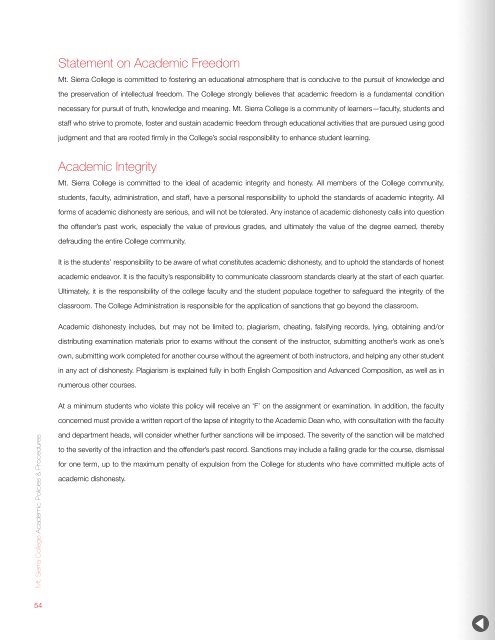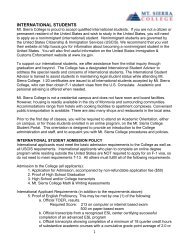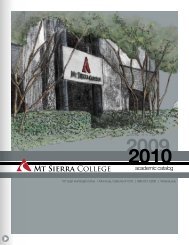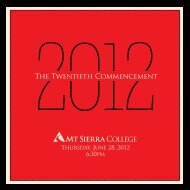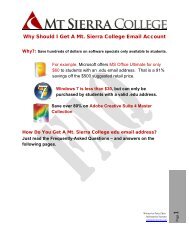Academic Catalog - Mt. Sierra College
Academic Catalog - Mt. Sierra College
Academic Catalog - Mt. Sierra College
Create successful ePaper yourself
Turn your PDF publications into a flip-book with our unique Google optimized e-Paper software.
<strong>Mt</strong>. <strong>Sierra</strong> <strong>College</strong> <strong>Academic</strong> Policies & Procedures<br />
54<br />
Statement on <strong>Academic</strong> Freedom<br />
<strong>Mt</strong>. <strong>Sierra</strong> <strong>College</strong> is committed to fostering an educational atmosphere that is conducive to the pursuit of knowledge and<br />
the preservation of intellectual freedom. The <strong>College</strong> strongly believes that academic freedom is a fundamental condition<br />
necessary for pursuit of truth, knowledge and meaning. <strong>Mt</strong>. <strong>Sierra</strong> <strong>College</strong> is a community of learners—faculty, students and<br />
staff who strive to promote, foster and sustain academic freedom through educational activities that are pursued using good<br />
judgment and that are rooted firmly in the <strong>College</strong>’s social responsibility to enhance student learning.<br />
<strong>Academic</strong> Integrity<br />
<strong>Mt</strong>. <strong>Sierra</strong> <strong>College</strong> is committed to the ideal of academic integrity and honesty. All members of the <strong>College</strong> community,<br />
students, faculty, administration, and staff, have a personal responsibility to uphold the standards of academic integrity. All<br />
forms of academic dishonesty are serious, and will not be tolerated. Any instance of academic dishonesty calls into question<br />
the offender’s past work, especially the value of previous grades, and ultimately the value of the degree earned, thereby<br />
defrauding the entire <strong>College</strong> community.<br />
It is the students’ responsibility to be aware of what constitutes academic dishonesty, and to uphold the standards of honest<br />
academic endeavor. It is the faculty’s responsibility to communicate classroom standards clearly at the start of each quarter.<br />
Ultimately, it is the responsibility of the college faculty and the student populace together to safeguard the integrity of the<br />
classroom. The <strong>College</strong> Administration is responsible for the application of sanctions that go beyond the classroom.<br />
<strong>Academic</strong> dishonesty includes, but may not be limited to, plagiarism, cheating, falsifying records, lying, obtaining and/or<br />
distributing examination materials prior to exams without the consent of the instructor, submitting another’s work as one’s<br />
own, submitting work completed for another course without the agreement of both instructors, and helping any other student<br />
in any act of dishonesty. Plagiarism is explained fully in both English Composition and Advanced Composition, as well as in<br />
numerous other courses.<br />
At a minimum students who violate this policy will receive an ‘F’ on the assignment or examination. In addition, the faculty<br />
concerned must provide a written report of the lapse of integrity to the <strong>Academic</strong> Dean who, with consultation with the faculty<br />
and department heads, will consider whether further sanctions will be imposed. The severity of the sanction will be matched<br />
to the severity of the infraction and the offender’s past record. Sanctions may include a failing grade for the course, dismissal<br />
for one term, up to the maximum penalty of expulsion from the <strong>College</strong> for students who have committed multiple acts of<br />
academic dishonesty.<br />
Satisfactory <strong>Academic</strong> Progress & <strong>Academic</strong> Status<br />
All students are required to maintain satisfactory academic progress. A student maintaining satisfactory progress is considered<br />
to be in good standing, and is eligible to continue his or her enrollment and to graduate. In addition, satisfactory academic<br />
progress is required to maintain financial aid eligibility. See the Financial Aid section of this catalog to learn more about the<br />
impact of progress upon Financial Aid eligibility.<br />
Student progress is monitored at the close of each quarter for the following three standards:<br />
1. Qualitative Progress (GPA)<br />
2. Quantitative Progress (Pace)<br />
3. Maximum Time in Program<br />
The following guidelines are observed in the calculation of satisfactory academic progress:<br />
A. All periods of attendance are reviewed;<br />
B. Attempted credit hours include all withdrawn courses, remedial courses, repeated courses, and courses with<br />
incomplete or failing grades;<br />
C. Transfer credit will be included in the calculation of earned and attempted credit hours;<br />
D. If a student changes his or her program of study, coursework not applicable to the new program will not be included<br />
in the calculation of progress.<br />
<strong>Mt</strong>. <strong>Sierra</strong> <strong>College</strong> <strong>Academic</strong> Policies & Procedures<br />
55


